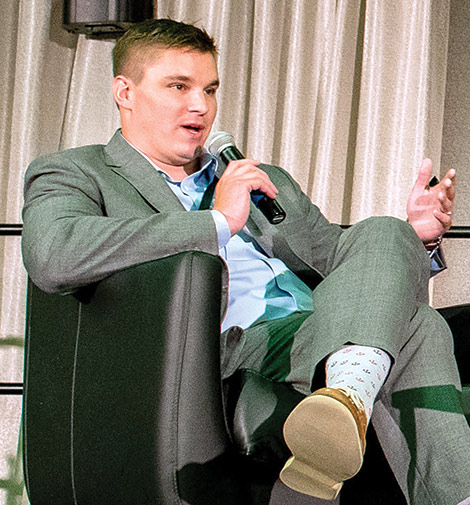A gathering to honor UMBC founders provides insights in university history.
The Roots of Greatness Luncheon, held September 17, celebrated the founding generation of students, faculty, and staff. Among the highlights of the program was a portrait of founding chancellor Albin O. Kuhn, delivered by Wendy Salkind, professor emeritus of theatre, and a discussion of a new history of the university – Improbable Excellence: The Saga of UMBC – written by George La Noue, professor emeritus of public policy and political science. The discussion was moderated by John Jeffries, dean emeritus of the College of Arts, Humanities and Social Sciences, and included two alumni – David Bennett ’11 and Yasmin Karimian ’11 – who worked on the book. What follows are edited excerpts of the program.
— Laura Lefavor ’13
Wendy Salkind on Albin O. Kuhn
Albin O. Kuhn – the founding chancellor of UMBC – wasn’t much on speeches and statements. His first letter to students, printed in the very first edition of what would eventually become The Retriever Weekly, observed drily that:
“We do not expect UMBC to be quite like any other campus….”
In one interview, Kuhn spoke about the sales pitch he used to recruit the founding faculty of UMBC:
“That was the thing we talked about a lot when we were trying to attract original faculty and staff. ‘Want to be a pioneer? Come join us. You can develop it and help to make it what it will be…’ It wasn’t a
bad thing to get that kind of person.”
Kuhn began his career in agronomy. He was a grower. And he brought that background along with him to
grow UMBC. Agronomy is a highly interdisciplinary field. Agronomists had to work across boundaries with biologists, botanists, and entomologists. Kuhn [once observed] that interdisciplinary was a concept he also saw as vital to UMBC:
“At the time we came to being developed, universities were undergoing an evolution…toward, as Clark Kerr said in some of his speeches, ‘a prime instrument of national purpose.’ You can’t do that with just science. You have to do that with understanding people. You have to do that with understanding the real drive that’s involved in the humanities and arts. When you put it all together, it can be very forceful. Without all of it together, you won’t get there….”
Kuhn also provided the words that our current president, Freeman A. Hrabowski, III, continues to say to our graduates as they leave the university community to find their own paths. They are special words and still ring true for successive generations:
“If you bring to the future the same personal qualities and personal commitment you have brought to this campus as students, good and important things will happen to each of you, as well as to those around you … and the university community will be proud to have played a part in your life.”
Discussion of George La Noue’s Improbable Excellence

John Jeffries: What contributions did you think [Improbable Excellence] was going to make as you set out on the journey [to write it]?
George La Noue: UMBC has dramatically expanded in almost every way you can think of in 50 years, but there’s always an enriching new flow of students, faculty, and administrators who would have no way of knowing its history. And if you don’t understand institutional history, you may have an incomplete view of institutional values….
Jeffries: Once folks actually get their hands on the book and go through it, they’ll see [it has] a focus and framework around the politics and policy of higher education.
La Noue: Well, guilty as charged…. That’s something I really never regretted. The most common format is administration by administration chronology kind of an encyclopedic view of university history. They are dull, dull, dull, and they don’t exactly work for UMBC because of the extraordinary achievements and tenure of [UMBC President] Freeman Hrabowski….
Furthermore, I think a top-down view of the university really misunderstands the successes and failures that happen on a daily basis in a university. Administrators are enormously important both system-wide and on this campus, but they don’t teach classes, they don’t get the research grants, they don’t direct plays and musical performances, and they don’t win games….
Jeffries: What did you find in your research that was surprising or unexpected?
La Noue: The first thing I found that was surprising was the history of the campus lands. You know we all work here, but we don’t most of us think much about that. There is actually archeological evidence [of human habitation] dating back to 8000-3500 B.C.E…. In the 17th century, the Piscataway tribe occupied the lands and they would kill wolves, and then the white settlers would claim the bounty for the wolves. That was probably not politically correct, but it was done. In the 18th century, Daniel Webster and Henry Clay would take waters at the Sulphur Spring Inn, and the remnants of that [spa] are barely still in the campus….
Jeffries: To what degree do you find UMBC to be sui generis?
La Noue: UMBC was one of the several dozen new-wave urban universities created in the ’50s and ’60s as the demand for higher education expanded. The traditional flagship campuses were not well located to handle an influx of new students – or did not want to. From the beginning, it was like the other new-wave campuses designed to be a research institution. That’s very important. In other respects, UMBC was very different. It was so close to the downtown UM campuses that it could never have the traditional array of professional schools. Further, there were so many other public and private universities in Baltimore and the Baltimore metropolitan area – nine to be exact – that we did not have the built-in political and business support that say a University of California, San Diego or a University of North Carolina, Charlotte had immediately. That made fundraising and program approval very difficult.
Jeffries: What particular challenges did you experience in the research and writing?
La Noue: How do you create records in a situation where the archives are being formed? Where contemporary newspaper documents are really very sparse? Then I got lucky. Serendipity. It came in the form of the UMBC undergraduate research tradition. I was lecturing on higher education desegregation in my Constitutional Law class one day and I mentioned a few things about UMBC’s history, [for instance, UMBC was] the only non-segregated public university in the state. And students were very interested. It’s one of those moments when you’re teaching and they get engaged. So I came up with the idea of forming the UMBC history team of nine undergraduates who wrote extensive original research papers on various topics in the book. Some of their work was so good I had difficulty avoiding plagiarism, because their research and articulation was so impressive….
We’re fortunate to have two of their representatives with us today: Yasmin Karimian and David Bennett.

David Bennett: I heard about the independent study opportunity of working a semester-long on a specific paper…I looked at the Social Sciences here at UMBC, so I had the opportunity… to sit down with the various chairs of those departments… some of them who have been here for many, many years to discuss what that department looked like back then and what it looks like now. It’s really quite astounding to see the determination of folks who were in their early thirties to form these departments to [become] what they are today…. Now I’m a health policy advisor for Senator John McCain in Washington, D.C.

Yasmin Karimian: I got connected to Dr. La Noue through Dr. Hrabowski. I visited Dr. Hrabowski one day and I said, “I think I want to go to law school.” He looked at me, and he said, “Go take Dr. La Noue’s class, and if you get an A we’ll talk about it.” I loved his classes and continued taking them and ended up on the UMBC History team. I did go to law school. I graduated two years ago from Georgetown Law. I now work at Amazon in contracts, but I actually got reconnected to Dr. La Noue this past year. I ended up indexing the book….
Jeffries: What would you say are the principal conclusions that you drew from your study?
La Noue: One is that UMBC’s location turned out to be a great plus…. We were placed as far south in Baltimore County as you could possibly be placed because Towson State is in the county seat, but we are, in fact, in the center of the state and increasingly transportation has gotten easier. We are also located in one of the greatest centers in the world of talented professionals of all sorts…. Maryland has high quality public education and so produces many good students who formerly had to go out of state to get the kind of research undergraduate experience that they needed. UMBC has developed a national reputation of excellence in many areas in part because of the unflagging efforts of Dr. Hrabowski, but also because of the work of faculty and staff that made those claims of excellence credible. Given our ambitions, UMBC is still inadequately supported by state funding and private giving, as demonstrated in the book. It still faces hurdles in program approval. And should the plaintiffs prevail in a case now in the federal courts… then UMBC might lose some of its key programs. Then there is the problem of the ambitions of state flagship campuses for global eminence may end up trampling the welfare of other public institutions.
Finally, in the last several decades, the economic enterprise nationally has become less collegial and more corporate in its character. There is more emphasis on institutional branding, an insatiable seeking for status, and a trend toward using faculty as income producers rather than its truth seekers…. At this moment in our history, universities might well ask if they’ve done enough to raise the deep and unsettling
questions necessary to any society. Historians are not good prophets and so Improbable Excellence concludes this way: “For UMBC with uncertain political support and awkward name surrounded by well established public and private competitors and unable to launch its own professional schools, seeking excellence at its founding by following the traditional route seemed almost most improbable. Instead, UMBC has developed a new model and perhaps the quest for excellence may be a permanent part of UMBC culture. The only thing that can be known for sure is that the past cannot be changed but the future depends on those who care for it.”
You can watch the entire Roots of Greatness event at 50.umbc.edu/weekendroundup.
You can buy George La Noue’s Improbable Excellence at the UMBC Bookstore (bookstore.umbc.edu).
Tags: Fall 2016, George La Noue, Improbable Excellence, UMBC50

